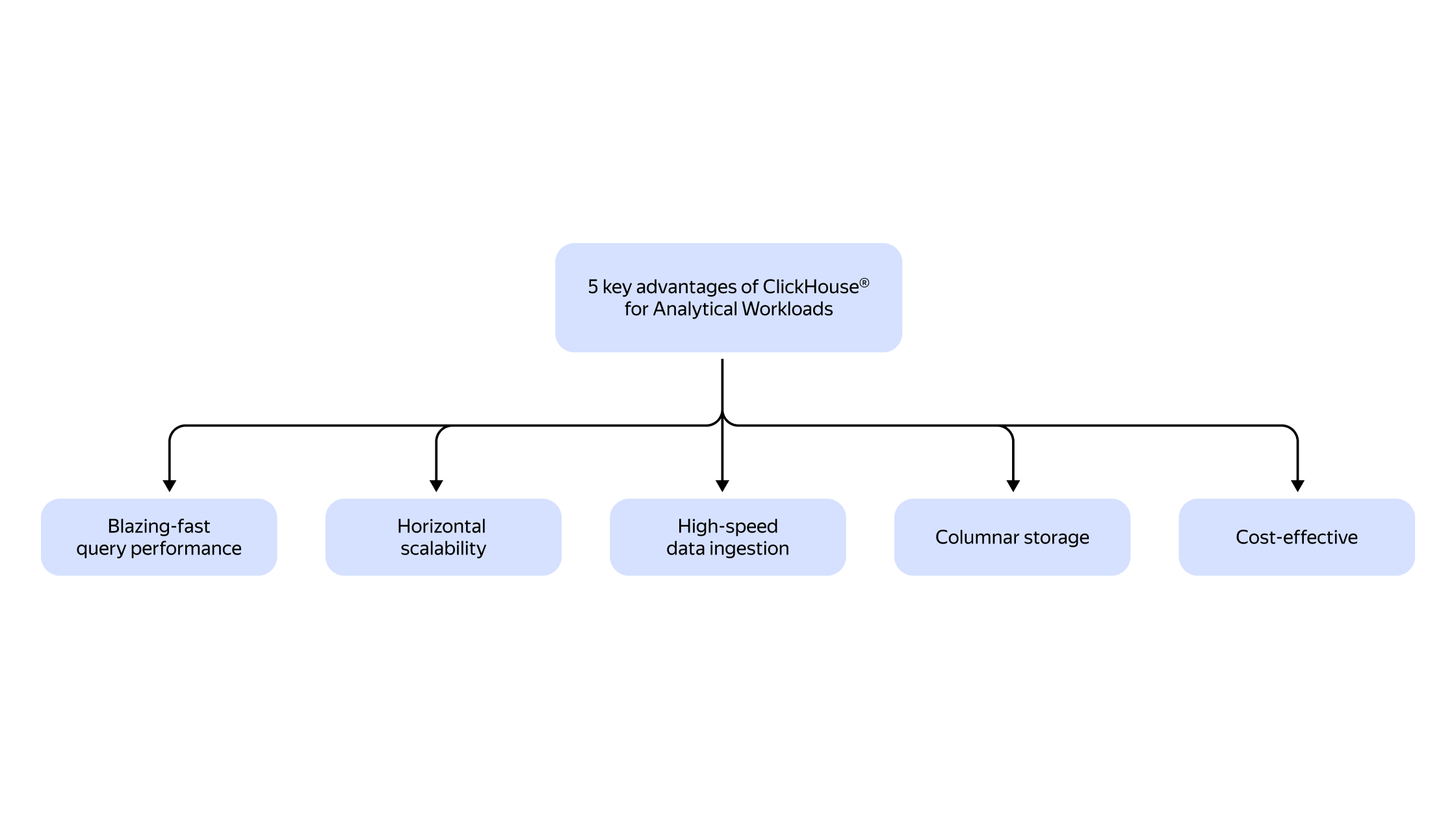
ClickHouse® vs PostgreSQL: Choosing the right database for your analytical workload
When it comes to having the right database for analytical workloads, two popular options that often come up in discussions are ClickHouse and PostgreSQL. Both databases have weaknesses and strengths, and understanding their features, performance, and use cases can help you make an informed decision.
ClickHouse and PostgreSQL are two popular databases used for analytical workloads. In this article, we will compare the key features of ClickHouse and PostgreSQL and discuss why ClickHouse may be a better choice for your analytical workloads.
What are ClickHouse and PostgreSQL
ClickHouse is an open‑source columnar database management system developed by Yandex, designed for fast and efficient analytics on large datasets. Due to its asynchronous data modification
PostgreSQL, or Postgres, is an open‑source relational database management system widely used for various data management tasks, including analytical workloads. Being a support to materialized view, this enables Postgresql to be known for its robustness, extensibility, and versatility. Exporting data with data recovery struggles with this.
ClickHouse vs PostgresSQL: Comparison table
| Difference | ClickHouse | PostgreSQL |
|---|---|---|
| Licence | Apache License 2.0 | PostgreSQL License |
| Open‑source | Yes | Yes |
| Architecture & Design | Columnar Storage, Distributed processing | Row oriented Storage, Client‑Server Model |
| Analytical Workloads | Built for Analytical Workloads | Suitable for OLTP and OLAP Workloads |
| Performance | High query performance, optimized for OLAP | Balanced performance for OLTP and OLAP databases |
| Scalability | Horizontally scalable, handles big data | Vertically scalable, suited for smaller databases |
| Data Consistency | Eventually consistent | ACID compliant, strong data consistency |
| Support | Community‑driven support | Enterprise and community support |
| Availability & Maintenance | Frequent updates, active community | Frequent updates, active community |
| Use Cases | Data Warehousing, Real‑time Analytics | General‑purpose Database Management |
| Cost | Free and open‑source | Free and open‑source, enterprise options available |
| Data Partitioning | Supports automatic data partitioning | Supports manual data partitioning |
| Replication | Built‑in support for replication | Supports streaming replication for high availability |
| Data Ingestion | High‑speed data ingestion | Supports data ingestion through various methods |
| Backup & Restore | Supports consistent backup and restore | Supports backup and restore mechanisms |
| JSON Support | Native support for JSON data | Supports JSON data with query type support |
| Speed | Optimized for fast data processing | Balanced insert performance and speed for OLTP databases and OLAP workloads |
| Query Performance | Blazing‑fast query performance | High‑performance query execution |
| Data Types | Supports various data types | Rich data type support |
| Secondary Indexes | Supports all kinds of indexes, including primary index and secondary indexes | Supports secondary indexes for performance optimization |
| In‑memory Capabilities | Supports in‑memory storage | Supports in‑memory storage for faster query execution |
| Community | Active and growing community | Active and established community and supports transaction |
| Installation | Easy installation and setup | Easy installation and setup |
What you should think about when choosing the right database
When choosing the right database for analytical workloads, there are several factors to consider. Comparing ClickHouse to PostgreSQL, the primary key is to evaluate the scalability and performance of the database, as well as its ability to handle large datasets and high‑speed data ingestion. It’s also important to consider the database’s licensing, cost, and support options.
Here are some points to remember:
- Data size and complexity: If you are dealing with large data volumes with complex relationships, ClickHouse’s columnar storage and parallel processing capabilities may provide better performance and scalability.
- Query complexity: If your analytical queries are complex and require processing large amounts of data in parallel, ClickHouse’s optimized query performance and parallel processing capabilities may provide better performance.
- Scalability: ClickHouse offers horizontal scalability with benchmark results, allowing you to add more nodes to the cluster as your data grows, ensuring seamless scalability as your analytical workload increases.
- Data ingestion: ClickHouse is designed for high‑speed data ingestion, making it suitable for use cases that require real‑time analytics or data processing.
- Extensibility: While PostgreSQL has a rich ecosystem of extensions, ClickHouse’s extensibility may have the same limitation. If you require specialized functionalities, PostgreSQL may be a better choice.

5 Key advantages of ClickHouse for analytical workloads
ClickHouse, with its user‑defined functions, offers several key advantages for analytical workloads:
- Blazing‑fast query performance: ClickHouse is optimized for fast query performance, making it ideal for use cases where query speed is critical. Continuous aggregates can process large amounts of data at lightning‑fast query speed, allowing for real‑time or near‑real‑time analytics.
- Horizontal scalability: ClickHouse offers horizontal scalability, allowing you to add more nodes to the cluster as your data grows, ensuring seamless scalability as your analytical workload increases regarding time‑series data. However, TimescaleDB compression, when turned on, outperforms ClickHouse.
- High‑speed data ingestion: ClickHouse is designed for high‑speed data ingestion, making it suitable for use cases that require real‑time analytics or data processing. It can efficiently handle data streaming and real‑time data ingestion, allowing for the timely analysis of large datasets.
- Columnar storage: ClickHouse creates a columnar storage model, providing efficient uncompressed data and data encoding, reducing storage requirements, and improving query performance.
- Cost‑effective: ClickHouse is open‑source software, which means it is free to use and requires no licensing fees. This makes it a cost‑effective choice for specific workloads, especially small and medium‑sized businesses.
Final words
Choosing the right database for your analytical workloads is crucial for achieving optimal performance and scalability. ClickHouse offers several advantages over PostgreSQL, including blazing‑fast query performance, horizontal scalability, high‑speed data ingestion, columnar storage, and cost‑effectiveness.